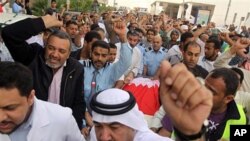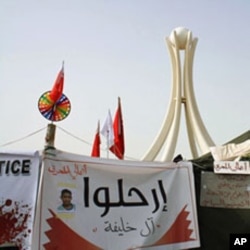Anti-government protests in Bahrain have reached the one-week mark, and despite a lull in violence, there seems to be no end in sight to the country’s political unrest.
Sporadic demonstrations across the Persian Gulf kingdom began on February 14 with what organizers called a "Day of Rage" against the government. Eventually, protesters massed at Manama’s Pearl Roundabout, but security forces later used deadly force to clear the area.
Following further violence and mounting international criticism, the government decided on Saturday that it would allow demonstrators to converge at the symbolic site, and the crown prince called for direct dialogue with all of Bahrain’s political parties.
Opposition leaders rejected the offer and said they needed time to formulate an agenda specifying their demands before any talks could take place.
Many demonstrators, such as Jasim Mohammed, don’t believe the opposition should engage in discussion with the government at all.
"Unfortunately the government, they don’t want to listen. This is the main problem," Mohammed said. "The crown prince is a very good guy, everybody likes to talk with him, but unfortunately, there is no power with our crown prince. All the power is with our prime minister and his party."
Whether to engage in dialogue with the government is not the only issue dividing demonstrators. There also doesn’t seem to be consensus on what they want from the government.
At the start of the week, protesters were calling for more rights and equalities and for the prime minister to resign. But since the deadly crackdown, many people, such as Salman Ali, have also started chanting for the ouster of the royal family.
"What we want here is for the government and the king to leave. We want to change the king and the government," said Ali.
According to another demonstrator, who only wanted to be known as Haman, those calling for the king to step down are being unrealistic.
"They don’t understand the situation in the region and they want to overthrow the ruling family. No, we don’t agree with them actually," said Haman. "And that’s why we have to set a ceiling for our demands in this country and there is a huge process now on the ground to unify and make it clear which ceiling we are speaking about, but the majority of people in Bahrain agree that [the king] al-Khalifa should stay, no problem, but according to certain criteria and constitutional rights."
Most protesters camping at the Pearl Roundabout on Monday afternoon said they were prepared to stay there until their demands were met - whatever those might be.


